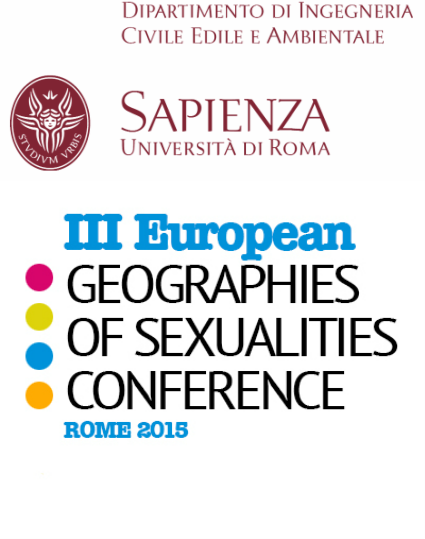The conference final program is now available.
Please visit the "Program" page: /program.html
Presentation and Call for papers
Please visit the "Program" page: /program.html
Presentation and Call for papers
|
Media and technologies have gained a prominent role in our everyday lives, (re)shaping the relation between bodies, space and sexualities. Through the use of specific apps (e. g. Grindr, Tinder, Brenda) as well as social networks (e. g. Facebook, Instagram), subjects both produce and consume sexualized spaces of multiple (virtual) encounters. These sexualized spaces are embedded within the temporalities of these media and technologies: for instance, the IRC chats, the HTML frame or the social media and the smart technologies open to different configurations of the relation between space and sexualities. Moreover the production and use of the interfaces these technologies are based on offer the possibility to play and experiment with identities, roles and desires.
These processes shape new morphologies for transnational metropoles and the people inhabiting them. New forms of sociability and new possibilities of encounter are then offered for everyday life both within cities and countryside/low-density areas, also redefining our meaning of place, space and territoriality. Studies, researches and analyses of how digital technologies and sexualities intervene in geographies are a brand new full study-sphere to discover. The access to these instruments and spaces is uneven: on one side a young generation appears as “digital natives”; on the other, some subjects appear as “non-digital”. This “digital divide” can be linked to a multiplicity of factors: uneven territorial development, generational divide, informatic illiteracy, or even a critical choice of self-exclusion. Whilst recognizing their potential, we should also be aware of how these technologies can be appropriated and managed by hegemonic powers for controlling, disciplining and even punishing (sexual) dissidents. This ambivalence becomes crucial when considering the political dimension of these instruments. On one side, media, technologies and social networks open new forms and languages of political activism and contention, favouring the creation of long-distance ties and the sharing of mottos and practices. On the other, police and other institutions can use the same instruments to repress, punish and control sexual dissidence in its multiple forms. Following two previous conferences held in Brussels in 2011 and in Lisbon in 2013, this conference aims to bring together all those scholars, activists and subjects within geography (and beyond) who are interested in creating a space of open debate and discussion around multiple issues related to the relation between media, (urban) space and sexualities. On the basis of the above rationale, we invite the submission of papers, panels, and other original contributions dealing with these themes. Topics of interest could be (but are not limited to): - the spatialities of the (sexual) encounters favoured by media and technologies: do cities occupy a prominent role? Which possibilities are offered by media and technologies in low-density and rural areas? - how the relation between medias and sexualities reshapes “cityness” and the rural/urban divide; - which possibilities are opened by transmediality in relation both to everyday (sexual) life and the research process itself? Do media and technologies make sexual dissidents’ lives more "liveable"? - how diverse subjectivities (e. g. lesbians, gay, trans) in diverse places and times appropriate and use differently media and technologies; - online (sexualized) communities: their aims, compositions, potentialities; - exploring the “digital divide” both in the Global North and the Global South, including the multiple axes of inclusion and exclusion (e. g. age, class, education, territorial informatics divide); - race and digital control: new technologies of power? - media, technologies and (sexual) identity. How is desire expressed and reshaped? - the subjection/subjectification dialectics of media and technologies: opening spaces of possibility or (re)producing control and discipline? - the production of new normativities: which new (sexualized) norms are (re)produced through these instruments? - “hook-up” apps and social media: which possibilities do they offer? How do institutions use them to control, discipline and repress? - the appropriation and use of these instruments by sex workers; - queer politics and activism online: new forms, possibilities and limits; - online performances and queer art; - how these new technological instruments reshape research methods and possibilities. What happens to "traditional" methods and methodologies? - the new ethical dimensions raised by these new devices in the research process. We encourage contributions in a diverse range of formats. Alongside traditional academic conference papers, we welcome panel discussions, open space discussions, film screenings, installations and other contributions. We seek to foster networking, debate and discussions across national borders, across language communities, and across academic disciplines. Language: we plan a multilingual conference, and encourage participants to present in the language they feel most comfortable in using among English, French, Italian, Portuguese and Spanish. Confirmed key-note speakers: Jason Ritchie (Florida International University, USA) Katrien Jacobs (Chinese University of Hong Kong, China) Lucas Platero (Universidad Rey Juan Carlos Madrid, Spain) Manuela Picq (Universidad San Francisco de Quito, Ecuador) Michael Brown (University of Washington, Seattle, USA) Nicola Mai (LAMES, Aix-Marseille University and London Metropolitan University, UK) Shaka McGlotten (Purchase College, New York, USA) |

